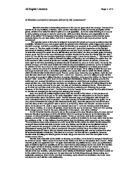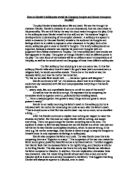Is Hamlet Really Insane?
Hamlet’s Play-acting Madness Is a person really ever mad? Or are their minds so sane it almost seems unreal? The human mind works in many ways; it is full of many wonders and abilities not common to men himself. Shakespeare’s Hamlet portrays the main character Hamlet to be an insane individual in certain parts of the play. When his father’s ghost appears enforcing Hamlet to avenge his death against his uncle Claudius, he brings forth a plan to make it seem like he has gone mad liberating him from public questioning and giving him time to seek revenge. However, it is questioned that within all the plotting and pretending to be insane, Hamlet really does indeed go mad. Hamlet’s focus to seek revenge makes him a good actor in the sense that he really does make others believe he has gone mad, however he is completely sane throughout the entire play. His intelligence to convince others he is crazy, his will to keep going and his obsession with getting revenge on Claudius makes Hamlet such a convincing character, it triggers the thought of his actual state. Intelligence can be measured in a variety of different ways. There are individuals who use their intelligence for the good to help people and others who use it to go against people. Hamlet, being a very intelligent man uses his intelligence for his benefits to go against others such as his uncle Claudius. In the
Explore some of the ways in which Shakespeare creates a sense of disorder in Hamlet
Omar Bates Explore some of the ways in which Shakespeare creates a sense of disorder in “Hamlet” Hamlet was written during the seventeenth century during which Britain was going through a time of social anxiety there was no certain heir to throne as Elizabeth was nearing her end of her reign. This uncertainty is mirrored in the play through the death of the king of Denmark and so highlights a key subject in Elizabethan lives during which this play was being performed. Shakespeare uses this to create a fear of the unknown and effectively establishes disorder. A sense of disorder is created right from the start to keep the audience in anticipation of an imminent discovery, as Shakespeare sets the scene as a chilly, misty night outside Elsinore castle. “Bernardo: Who’s there? Francisco: Nay answer me. Stand and unfold yourself.” The audience is made aware that both guards are unable to see each other creating a sense of disorder and uncertainty as an attack could be imminent, but they wouldn't be prepared due to the lack of light on the set. Shakespeare foreshadows signs of chaotic events to create anticipation and build an atmosphere of uncertainty and disorder until finally a climax of tragedy and disaster is reached. Shakespeare using foreshadowing early in his writing to create a sense of disorder is apparent in Romeo and Juliet, as from the
Compare and contrast how Shakespeare and Marlowe explore attitudes to death and the afterlife throughout the plays Hamlet and Faustus.
Compare and contrast how Shakespeare and Marlowe explore attitudes to death and the afterlife throughout the plays Hamlet and Faustus. Hamlet and Doctor Faustus have a preoccupation with death and the afterlife. The protagonists' attitudes towards death drastically change as the plays progress. Hamlet is at first very scared of what the afterlife holds, but then begins to accept the inevitability of his death. At the beginning Faustus shows no fear of dying or of hell, but when death is upon him he starts to despair of his ensuing eternal punishment. At the beginning of the play, Faustus is ambivalent about death and the afterlife. He says " I'll conjure though die" emphasising his refusal to stop practising necromancy despite knowing that it will lead to his demise and eternal punishment. The Chorus hints to the audience that Faustus' pride and over-reaching ambition will inevitability lead to his downfall when he parallels him with Icarus in a classical allusion, whose "wings mount[ed] above his reach". The words "settle", "depth" and "farewell" in Faustus' soliloquy all reference a closure and the imperative in his acknowledgement that he "must die an everlasting death" also highlights his inability to escape his fate. He declares that "damnation terrifies him not" and repeatedly mentions his "fortitude" to establish his lack of fear. Faustus is also told by
Explore the Ways the Theme of Death Develops and Changes in Hamlet and Doctor Faustus
Explore the Ways the Theme of Death Develops and Changes in Hamlet and Doctor Faustus Hamlet and Faustus have differing views on death at the start of each of the plays. Faustus is a typical character of an Elizabethan drama in the role of a man overreaching himself in his quest for knowledge: he believes that he knows all there is to know about what happens after death and Faustus “confounds hell in Elysium” which shows that he doesn’t fear hell: instead he believes that his knowledge will give him access to the pagan afterlife of the Greek philosophers. During Faustus’ first conversation with Mephistopheles Faustus constantly refers to himself in the third person. Marlowe does this to show that Faustus is distancing himself from making the deal with Mephistopheles and is not completely confident in his thinking. Faustus’ desire for further forbidden knowledge is prompted by his view that he has attained all permitted knowledge. In full awareness of what he is doing Faustus bids “divinity, adieu!” in order to pursue magic and become, in his eyes, a Godly figure. This certainty that Faustus shows deeply contrasts with Hamlet’s ambiguous views on the afterlife. Hamlet in Act 1 Scene ii, desires that this “too too sullied flesh would melt, thaw and resolve itself into a dew!”. However, Hamlet doesn’t commit “self-slaughter” because of the “dread of
Key Scene - Closet scene, Act III scene IV Hamlet
Choose a play in which there is a scene involving a moment of conflict or of resolution to conflict. By referring to details of the scene, explain how the dramatist presents this moment and discuss how this contributes to your appreciation of the play as a whole. Key scene / turning point essay Hamlet In ‘Hamlet’ by William Shakespeare, Hamlet resolves his conflicts with Polonius and with his mother, Gertrude, in Act III scene IV, the closet scene. In this scene, Hamlet confronts his mother and shames her for her overhasty marriage to Claudius and also accidentally murders a spying Polonius by mistaking him for Claudius. From the beginning of the closet scene, Hamlet easily takes control of the stichomythia and succeeds in shaming his mother to the point where she begs Hamlet to stop. (Gertrude) “Hamlet, thou hast thy father much offended. (Hamlet) Mother, you have my father much offended.” Following Hamlet’s entrance to the scene, Gertrude futilely attempts to exemplify her authority and chide Hamlet for his recent actions. However, by accosting her with a violent intensity, Hamlet gains the upper hand of the stichomythia and declares that he intends on making her fully aware of the profundity of her sins. Hamlet makes his mother aware of her own hypocrisy by deliberately using the rhythm and the words of her reprimands, thereby turning the accusations from
Analysis of Act 1 - Hamlet
Analysis of Act 1 The supernatural appearance of the ghost on a chilling, misty night outside Elsinore Castle indicates immediately that something is wrong in Denmark. The ghost serves to enlarge the shadow King Hamlet casts across Denmark, indicating that something about his death has upset the balance of nature. The appearance of the ghost also gives physical form to the fearful anxiety that surrounds the transfer of power after the king's death, seeming to imply that the future of Denmark is a dark and frightening one. Horatio in particular sees the ghost as an ill omen boding violence and turmoil in Denmark's future, comparing it to the supernatural omens that supposedly presaged the assassination of Julius Caesar in ancient Rome (and which Shakespeare had recently represented in Julius Caesar). Since Horatio proves to be right, and the appearance of the ghost does presage the later tragedies of the play, the ghost functions as a kind of internal foreshadowing, implying tragedy not only to the audience but to the characters as well. This supernatural theme is illustrated from the outset when, only 25 lines into the book the subject of the ghost is introduced when Horation says "What, has this thing appear'd tonight?". Later on into the scene Hamlet after being told about the ghost, decides to see it for himself and after he does so he has a great deal of
With specific reference to the two soliloquies, which we have studied in detail, show how Shakespeare reveals to the audience Hamlet's character, state of mind and his problems.
With specific reference to the two soliloquies, which we have studied in detail, show how Shakespeare reveals to the audience Hamlet's character, state of mind and his problems. The two soliloquies of which I studied were quite different as the one from act one scene two is very sad and lifeless whereas the soliloquy taken from act three scene one is calm and solemn. You can get a clear picture of the first soliloquy as being lifeless as Hamlet remarks "How, weary, stale, flat and unprofitable." Hamlet also seems to repeatedly mention the death of his father. "So excellent a king, that was, to this." "With which she followed my poor fathers body." Then in the second soliloquy Hamlet realises his father was murdered and begins to say that he wants to just fall asleep and wake up later on in life with all his troubles swept away. He also goes onto say that he is either going to lie back and give up or stand up and fight back for what he believes in. However the biggest similarity between the two soliloquies is that they both relate to death. The perception that we get from Hamlet from the two soliloquies was that in the first soliloquy Hamlet is in an open public place and doesn't care about the things he is saying and you know this by the amount of exclamation marks and the use of repeated vocabulary. "O, God! O, God!" "Fie on't! O, Fie!" Then you look at the second
Why Does Hamlet Delay?
Why Does Hamlet Delay? "Vengeance is mine. I will repay, says the Lord." I want to attribute the cause of Hamlet's procrastination in carrying out the noble mission, top this fantastic theory, which exercised a major influence on the earlier Elizabethan revenge plays beginning from Gorboduc to The Spanish Tragedy. Of course, I do not over simplify the idea to say that Hamlet delays in taking revenge because Fate makes him do so; what I would state is that in Hamlet Shakespeare tried to give a new dimension to the traditional revenge theme by subjecting it to human consideration, philosophic speculation and ignoring the authority of Providence. It is, I think, the Renaissance, which inspired the playwright to emphasize the human viewpoint by focusing on the greatness of man - "What a piece of work is a man, how noble in reason, how infinite in faculties, in form and moving how express and admirable, in action how like an angel, in apprehension how like a god ......" But to his disillusionment he found that human endeavor is not enough; man cannot execute revenge to establish justice willingly; it is the business of Providence - "Ay, heaven will be reveng'd of every ill." [Thomas Kyd: The Spanish Tragedy (III: xiii)] Shakespeare shows this human failure by picturing Hamlet as a modern man - a man of complex psychology, reflective philosophy and existentialist





















